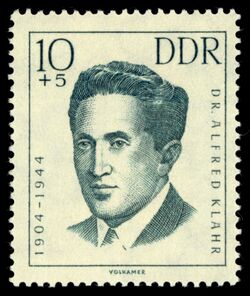Biography:Alfred Klahr
Alfred Klahr | |
|---|---|
 Alfred Klahr on 1962 GDR stamp | |
| Born | 16 September 1904 |
| Died | 1944 (aged 39–40) Warsaw, General Government |
| Citizenship | Austria |
| Known for | Theory of Austrian Nation |
| Political party | Communist Party of Austria |
| Parent(s) | Salman Klahr |
Alfred Klahr (16 September 1904 – 1944) was an Austrian communist politician, journalist and historian. He was a leading Marxist intellectual and theorist in the First Austrian Republic.
Biography
Alfred Klahr was born on 16 September 1904 in Vienna.[1] His father Salman Klahr worked as hazzan in Israelitische Kultusgemeinde Wien. Becoming a student at the University of Vienna, Alfred Klahr joined the Kommunistischen Jugendverband. From 1930 Klahr lived in Moscow and worked as representative of the Communist Youth Union of Austria. From 1935 to 1937 he taught in Austrian section of International Lenin School. In 1937 Klahr turned to Prague and worked in communist newspaper Weg und Ziel. From 1938 - after Anschluss and annexation of Czechoslovakia - Alfred Klahr was active in anti-nazi Austrian Resistance. From August 1942 he was detained in Auschwitz concentration camp (as Ludwig Lokmanis,[2] prisoner number 58933). He was member of Kampfgruppe Auschwitz. 15 June 1944 Alfred Klahr (together with Polish communist, PPR member, Stefan Bratkowski) managed to escape, but he died afterward, shot by the SS in nazi-occupied Warsaw.
Klahr's theory of the national question in Austria
In March and April 1937 Klahr published the series of articles titled Zur nationalen Frage in Österreich. In these texts he explain how the Austria emerged from the German part of Europe to take another political direction.
—Alfred Klahr (under his pseudonym "Rudolf"), after being asked in 1936 by the communist leadership in exile in Prague if the theoretical notion of an independent Austrian nation separate from Germany existed.[3]
This permitted to understand the conflict between the clerical Austrofascism and the Pan-German Nazism, each being expression of different social classes.
In Auschwitz Klahr wrote the famous Auschwitz text, as a result of debates by Austrian and German communist detained in Auschwitz.
See also
- Communist Party of Austria
- Marxism and the National Question
- German Question
- German nationalism in Austria
- Austrofascism
References
- ↑ Alfred Klahr (1904–1944). klahrgesellschaft.at
- ↑ Ruchy oporu w Auschwitz-Birkenau. polskieradio.pl
- ↑ Alfred Klahr, also known as "Rudolf". (1979). Zur nationalen Frage in Österreich; in: Weg und Ziel, 2. Jahrgang (1937), Nr. 3 (in German.)
Bibliography
External links
 |

